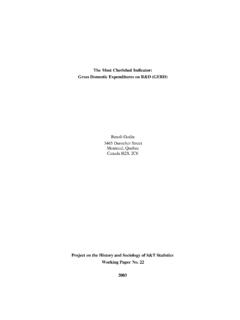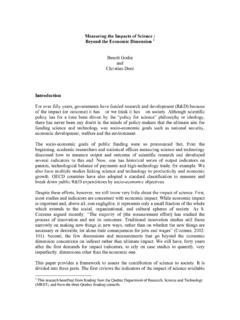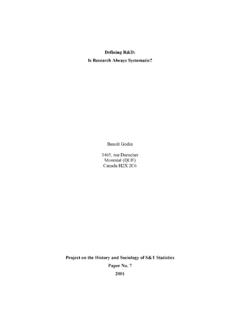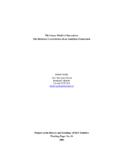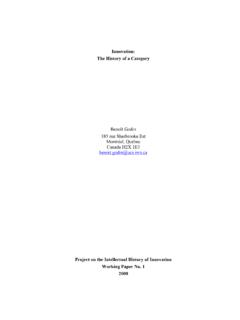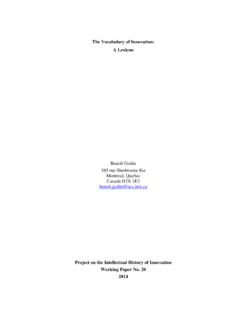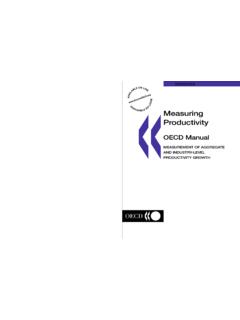Transcription of What is Science? Defining Science by the Numbers, …
1 what is Science ? Defining Science by the Numbers, 1920-2000 Beno t Godin 385 rue Sherbrooke Est Montreal, Quebec Canada H2X 1E3 Project on the History and Sociology of S&T Statistics Working Paper No. 35 2007 Previous Papers in the Series: 1. B. Godin, Outlines for a History of Science Measurement. 2. B. Godin, The Measure of Science and the Construction of a Statistical Territory: The Case of the National Capital Region (NCR). 3. B. Godin, Measuring Science : Is There Basic Research Without Statistics? 4. B. Godin, Neglected Scientific Activities: The (Non) Measurement of Related Scientific Activities. 5. H. Stead, The Development of S&T Statistics in Canada: An Informal Account. 6. B. Godin, The Disappearance of Statistics on Basic Research in Canada: A Note. 7. B. Godin, Defining R&D: Is Research Always Systematic? 8. B. Godin, The Emergence of Science and Technology Indicators: Why Did Governments Supplement Statistics With Indicators?
2 9. B. Godin, The Number Makers: A Short History of Official Science and Technology Statistics. 10. B. Godin, Metadata: How Footnotes Make for Doubtful Numbers. 11. B. Godin, Innovation and Tradition: The Historical Contingency of R&D Statistical Classifications. 12. B. Godin, Taking Demand Seriously: OECD and the Role of Users in Science and Technology Statistics. 13. B. Godin, what s So Difficult About International Statistics? UNESCO and the Measurement of Scientific and Technological Activities. 14. B. Godin, Measuring Output: When Economics Drives Science and Technology Measurements. 15. B. Godin, Highly Qualified Personnel: Should We Really Believe in Shortages? 16. B. Godin, The Rise of Innovation Surveys: Measuring a Fuzzy Concept. 17. K. Smith, Measurement of Innovation in Europe: Concepts, Experience and Results. 18 B. Godin, A Note on the Survey as Instrument for Measuring S&T. 19 B. Godin, Rhetorical Numbers: How the OECD Constructs Discourses on Science and Technology.
3 20. B. Godin, Are Statistics Really Useful? Myths and Politics of Science and Technology Indicators. 21. B. Godin, The New Economy: what the Concepts Owes to the OECD. 22. B. Godin, The Most Cherished Indicator: Gross Domestic Expenditures on R&D (GERD). 23. B. Godin, Technological Gaps: Quantitative Evidence and Qualitative Arguments. 24. B. Godin, The Knowledge-Based Economy: Conceptual Framework or Buzzword? 25. B. Godin, The Obsession for Competitiveness and its Impact on Statistics: The Construction of High Technology Indicators. 26. B. Godin, Globalizing Indicators: How Statisticians Responded to the Political Agenda on Globalization. 27. B. Godin, The Who, what , Why and How of S&T Measurement. 28. B. Godin, Research and Development: How the D Got Into R&D. 29. B. Godin, Technological Progressiveness as a Precursor to the Concept of High-Technology. 30. B. Godin, The Linear Model of Innovation: the Historical Construction of an Analytical Framework.
4 31. B. Godin, Science , Accounting and Statistics: the Input-Output Framework. 32. B. Godin, From Eugenics to Bibliometrics: Galton, Cattell and Men of Science . 33. B. Godin, On the Origins of Bibliometrics. 34. B. Godin, The Value of Science : Changing Conceptions of Productivity, 1869-circa1970. Project on the History and Sociology of STI Statistics 385 rue Sherbrook Est, Quebec H2X 1E3 Telephone: (514) 499-4074 Facsimile: (514) 499-4065 2 Abstract what is Science ? is an old question. Scientists, and also philosophers, sociologists and economists, have all developed their own definitions of Science . While these contributions have been intensively analyzed in the literature, there remains one influential definition of Science that has never been examined from an historical point of view: the official (or government) definition. Since the 1920s, governments have used a specific definition of Science to comprehend this phenomenon that was increasingly shaping society and the economy.
5 This definition centers on research, or R&D. This paper examines the official definition of Science , and its construction, over the period 1920-2000. The definition of Science as research owes much of its origin to statistics. Among all the scientific activities, research was the activity on which government started collecting numbers in the 1920s. Defining Science as research was standardized in 1962 in a methodological manual known as the OECD Frascati manual. Several alternative definitions have been suggested since then, but all have failed to modify or extend the definition to be more inclusive of Science 's diverse activities or dimensions. 3 what is Science ? Defining Science by the Numbers, 1920-2000 Introduction what is Science ? (or a scientist) is an age-old question. That some disciplines have, for decades, been considered more scientific and held a status superior to is a well-known fact to historians.
6 1 Behind the hierarchy stands a definition of Science and criteria for qualification (maturity). For early scientists and philosophers, Science was defined as knowledge and on epistemic grounds. The method of producing true knowledge was what distinguished Science from other kinds of knowledge: observation, induction, and deduction were the key terms of the debates. Such an understanding, however, was not without its opponents. 2 Soon, it was the turn of the social sciences and humanities to be confronted with questions as to whether they really were sciences . People were divided into two camps: those who thought the social sciences should adopt the method of the natural sciences and search for laws, and those who insisted on the individuality of the social sciences and humanities. 3 To the latter group, composed of W. Dilthey, H. Rickert and M. Weber, among others, social sciences and humanities aimed at understanding rather than (solely) explaining.
7 1 Dupree (1976), The National Academy of sciences and the American Definition of Science , in A. Oleson and J. Voss (eds.), The Organization of Knowledge in Modern America, 1860-1920, Baltimore: Johns Hopkins University Press, pp. 342-363; O. N. Larsen (1992), Milestones and Millstones: Social Science at the NSF, 1945-1991, New Brunswick: Transaction Publishers; D. O. Belanger (1998), Enabling American Innovation: Engineering and the NSF, West Lafayette: Purdue University Press. 2 W. B. Gallie (1957), what Makes a Subject Scientific?, British Journal of the Philosophy of Science , 8, pp. 188-139; R. M. Blake, C. J. Ducasse and E. H. Madden (1960), Theories of Scientific Method: The Renaissance through the Nineteenth Century, New York: Gordon and Breach (1989); R. Laudan (1981), Science and Hypothesis, Dordrecht: Reidel Publishing; R.
8 Yeo (1993), Defining Science : William Whewell, Natural Knowledge and Public Debate in Early Victorian Britain, Cambridge: Cambridge University Press. 3 P. Winch (1958), The Idea of Social Science and its Relation to Philosophy, New York: Routledge; K. O. Apel (1984), Understanding and Explanation: A Transcendental-Pragmatic Perspective, Mass. (Cambridge): MIT Press, pp. 1-79. 1 This century saw one more philosophical debate on Defining Science . The logical positivists defended a peculiar definition of Science in order to eliminate metaphysics, but also to unite all sciences under one model. To the Vienna Circle, a scientific statement was a logical and verifiable statement, and what was verifiable was only what could be observed. 4 Scientists and philosophers are not the only intellectuals trying to define Science (and demarcate it from other knowledge). In this century, economists have developed a specific definition of Science , centered on information.
9 Science thus defined has specific characteristics that make of it a pure public good: indivisibility, inappropriability and uncertainty were the characteristics of scientific knowledge. This conception of Science had important consequences for government policies: the lesson was for government to fund basic research because firms under-invest in this kind of research. 5 Sociologists, for their part, have defined Science , not on epistemic grounds, but as simply what scientists do and produce. R. Merton and his followers looked at Science from an institutional and professional point of view. 6 Science as knowledge was taken for granted. what needed explanation were the social factors and norms that drive the system of Science . Similarly, social constructivists, aided by the symmetry principle, never questioned scientific knowledge itself: Science is what scientists do. 7 This article looks at a neglected attempt to define Science in recent history: the government (or official) definition of Science .
10 This definition appears in surveys and methodological manuals devoted to measuring Science , particularly the OECD Frascati 4 P. Achinstein and S. T. Barker (1969), The Legacy of Logical Positivism, Baltimore: Johns Hopkins University Press. 5 R. R. Nelson (1959), The Simple Economics of Basic Research, Journal of Political Economy, 67, pp. 297-306; Arrow (1962), Economic Welfare and the Allocation of Resources for Invention, in National Bureau of Economic Research, The Rate and Direction of Inventive Activity: Economic and Social Factors, Princeton: Princeton University Press, pp. 609-626. 6 R. K. Merton (1973), The Sociology of Science : Theoretical and Empirical Investigations, Chicago: University of Chicago Press; J. Ben-David (1971), The Scientist s Role in Society: A Comparative Study, Chicago: University of Chicago Press.
